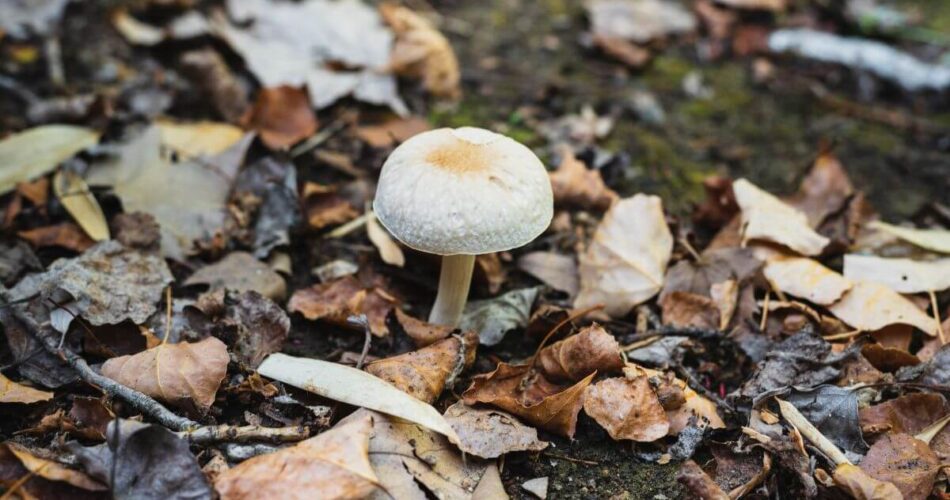This rare mushroom is found in the wild and has some amazing properties. In this article, we will discuss the guidelines for finding and identifying Psilocybe serbica, as well as provide tips for those who want to grow their own. Read on!
What Does Psilocybe Serbica Look Like?
Psilocybe serbica, from the Hymenogastraceae family, is a type of psilocybe mushroom found in Europe. They were described as new to science in the 1960s by Austrian mycologists Egon Horak and Meinhard Moser.
These mushrooms exhibit white spore prints and dark brown or purple-brown spores. They are relatively small mushrooms. The caps of these mushrooms are usually about 0.5 to 1.5 inches in diameter, and have a conical shape with a somewhat flat top. The mushroom is brown, with a yellow stipe, and yellowish-brown gills that are broad and adnate.
Where Does Psilocybe Serbica Grow?
Psilocybe serbica is a psilocybin mushroom, which grows in temperate zones on grassy meadows and pastures located in the region of Banat, Serbia, especially near the town of Vršac. This fungus appears in late September in central and Southern Europe. It is one of the few European species containing psilocybin and psilocin, substances that lead to psychedelic effects when consumed. These mushrooms grow on wood of deciduous trees such as beech, plane, elm, oak and hazelnut trees.
Usually, the mycelium grows on the stumps or on the roots of old trees that have been cut a long time ago. The shrooms are often found in places where there have been forest fires.
Content of Serbicas
The Psilocybe serbica is a very potent mushroom. The psilocybin content of these shrooms varies from 0.11% to 1.34% by dry weight, according to studies. The greatest amounts of baeocystin and psilocybin were found in the caps of the mushrooms. This is more than 5 times more psilocybin than in other magic mushrooms.
Psychedelic Effects of Psilocybe Serbica
Psilocybe serbica is a variety of psilocybe mushrooms that has gained increasing attention in recent years. As a potent psychoactive substance, this species can induce euphoric effects and intense hallucinations in users. However, it is also known to have some negative side effects. For example, Psilocybe serbica can cause things like nausea and stomach cramps in some cases, as well as trigger anxiety or panic attacks in susceptible individuals.
Potency
Additionally, the potency of this mushroom varies greatly from one specimen to another, with certain samples having up to triple the active ingredients of weaker ones. Despite these potential risks, Psilocybe serbica continues to be used recreationally by many people due to its ability to produce vivid and exciting sensory experiences. In short, this psychoactive fungus can be both powerful and unpredictable, making it an intriguing but sometimes hazardous addition to recreational drug use.
Can I Grow My Own Serbica Shroom?
While Psilocybe serbica mushrooms are not the easiest fungi to grow, it is possible to cultivate them at home with the right materials and a bit of patience. Mushroom cultivation requires sterile conditions, as even the smallest amount of contamination can ruin an entire crop.
For this reason, indoor mushroom growers typically use a method called “autoclave pasteurization” to sterilize their materials. This involves using a pressure cooker to subject the substrate to high temperatures, killing any harmful bacteria or fungi. Once the substrate has cooled, it can then be inoculated with a Psilocybe serbica mushroom culture. The inoculated substrate should be placed in a dark, humid environment, such as a terrarium or closet, and misted with water daily. With proper care, the mushrooms should begin to fruit within 3-4 weeks.
Similar Posts:
- Psilocybe Bohemica: A Psilocybin Mushroom From Europe. All the Information You Need to Know About the Species
- Psilocybe Subcaerulipes: A Japanese Mushroom That Contains Psilocybin. History & Morphology of the Species
- Psilocybe Baeocystis – Unusual Psilocybin Species. Identification, Potency & Characteristics
- Psilocybe Muliercula: Discover a Rare and Potent Magic Mushroom
- Psilocybe Caerulipes – Description of a Magic Mushroom, Its Potency and Habitat
- Psilocybe Silvatica. How Do You Grow and Consume Them? Shrooms Cultivation
- Orissa India Mushrooms. We Created a Guide to This Cubensis Strain & Tips on How to Grow Magic Mushrooms




